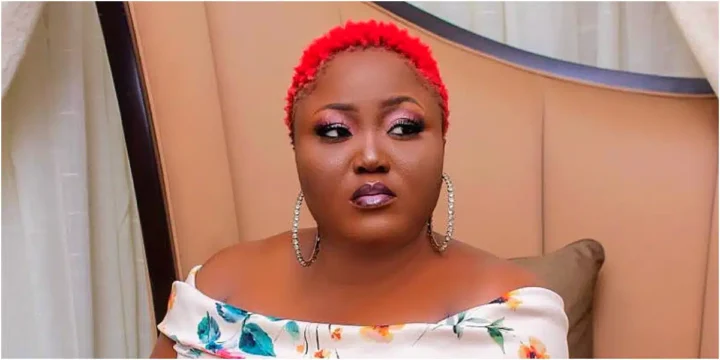Nollywood actress Blessing Obasi has said that a movie director once told her that she was too ugly to act. The moviestar recently revealed that she quit her job in the corporate world to start her acting career.
Speaking during an interview with OGHENOVO EGODO-MICHAEL about her career, Blessing stated that the director was someone she respected a lot, but he harshly concluded that she was not beautiful enough to be in front of a camera.

According to her, she seriously considered quitting the movie industry when the journey got really tough, but a direct message from Pastor Sam Adeyemi helped her stay strong and forge ahead.
The filmmaker added that God made her who she is today, and she is super grateful to everyone around her for their constant love and support.
Her words, “I remember a time when I felt like giving up. We had a programme— the Accelerate Conference at Elevation Church— and Pastor Sam Adeyemi preached. He said, “You’re here today, and you’ve told God that entertainment isn’t for you, that you don’t think you’ll make it. But I’m here to tell you it will make sense. Stay put.” I held on to those words and kept going.
It has truly been a journey of grace. God has made me who I am. My best friend and those around me have been incredibly supportive. Even when others advised me to quit acting and get a ‘real’ job, she stood by me. She would always say, “My akwam (egg), when you go blow, you go blow.”
I even remember when a popular director I deeply respected once told me I was too ugly to be in front of the camera. But look at me now.”
WOW.
Nollywood is a sobriquet that originally referred to the Nigerian film industry. The origin of the term dates back to the early 2000s, traced to an article in The New York Times. Due to the history of evolving meanings and contexts, there is no clear or agreed-upon definition for the term, which has made it a subject to several controversies.
The origin of the term “Nollywood” remains unclear; Jonathan Haynes traced the earliest usage of the word to a 2002 article by Matt Steinglass in the New York Times, where it was used to describe Nigerian cinema.
Charles Igwe noted that Norimitsu Onishi also used the name in a September 2002 article he wrote for the New York Times. The term continues to be used in the media to refer to the Nigerian film industry, with its definition later assumed to be a portmanteau of the words “Nigeria” and “Hollywood”, the American major film hub.
Film-making in Nigeria is divided largely along regional, and marginally ethnic and religious lines. Thus, there are distinct film industries – each seeking to portray the concern of the particular section and ethnicity it represents. However, there is the English-language film industry which is a melting pot for filmmaking and filmmakers from most of the regional industries.
Support InfoStride News' Credible Journalism: Only credible journalism can guarantee a fair, accountable and transparent society, including democracy and government. It involves a lot of efforts and money. We need your support. Click here to Donate
